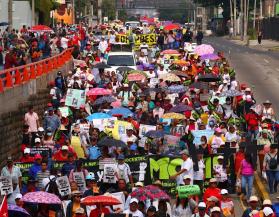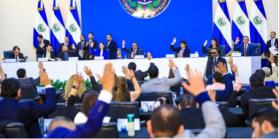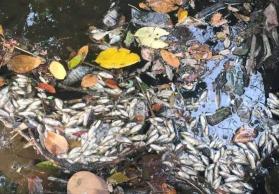CISPES Committees Take to the Streets!
by Cameron Herrington, Seattle CISPES
With a series of coordinated actions and events held in mid-October, CISPES and allies across the United States and Canada publicly launched a transnationalpeople's movement to stop exploitative metallic mining in El Salvador before itstarts. The series of events culminated on October 16 with a protest on thestreets of Vancouver, British Columbia, outside the headquarters of the PacificRim mining company. Pacific Rim filed a $77 million lawsuit against El Salvadorin April after the government refused to grant extraction permits for the ElDorado mining project due to environmental and public health concerns.
CISPES' leadership role in the growing cross-border, grassroots anti-mining movementstems from a proposal adopted in August at the organization's biennial NationalConvention, held in Seattle. Responding to the urgency created by recentassassinations and death threats against anti-mining organizers in theSalvadoran department of Cabañas [see article on page 3], CISPES activists havewasted no time in getting the new campaign up and running around the countrythis fall.
In the Northwest region, 25 activists from CISPES committees in Portland, Oregon, and Olympia and Seattle, Washington, travelled across the border to Vancouver to participate in the October 16 demonstration at Pacific Rim headquarters. Occupying all four corners of a busy downtown intersection for 3 hours, 60 demonstrators made their presence known to the company and passers-by with flyers, banners, chants, and speeches. Three representatives of the group delivered a letter to Pacific Rim management calling for the company to drop its lawsuit and cease operations in the Cabañas department.
Throughout the week leading up to the protest, hundreds responded to a CISPES Action Alert with phone calls and e-mails calling on Pacific Rim to “drop the suit!” Meanwhile, CISPES committees nationwide are using street theater, forums, presentations, and protests to begin the important work of educating supporters and community members about the threats posed to human life and the environment by the proposed mining projects in El Salvador.
The October 16 protest in Vancouver – coordinated with new allies from Salvadoran immigrant and Latin America solidarity organizations in British Columbia – kicked off a new, cross-border phase of the anti-mining struggle, which began in the early 2000s in Salvadoran municipalities where mining companies were carrying out exploration activities. Community organizations throughout northern El Salvador quickly coalesced to form a powerful coalition, the National Roundtable Against Metallic Mining in El Salvador, which now also counts the Catholic Church and internationally-recognized NGOs such as Oxfam among its ranks.
The National Roundtable has achieved significant success in preventing 29 proposed mining projects from being carried out in the northern zone of El Salvador. As a result of the coalition's extensive public education and lobbying work, recent polling finds over 60% of Salvadorans opposed to mining in their country. Meanwhile, the administrations of both former President Antonio Saca and current President Mauricio Funes declared their opposition to the mining projects and refused to grant permits, prompting Pacific Rim and Commerce Group, another mining company based in Milwaukee, Wisconsin, to sue the Salvadoran government.
Most recently, the National Roundtable received the prestigious Letelier-Moffitt International Human Rights Award from the Institute for Policy Studies. The award was presented in a ceremony held at the National Press Club in Washington, D.C., on October 15 and accepted by five representatives of the National Roundtable, who then took part in speaking tours that reached thousands of people throughout the U.S. and Canada. Miguel Rivera – a community leader from San Isidro, Cabañas – spoke in public events in Washington, D.C., Philadelphia, and Baltimore before traveling to Washington state and Oregon on a CISPES-organized tour from October 19-24.
In addition to confronting the immediate threat posed by the Pacific Rim and Commerce Group lawsuits, CISPES and the international anti-mining movement are highlighting the need to change the free trade rules that enable such lawsuits in the first place. Those rules, contained in Chapter 10 of the Central America Free Trade Agreement (CAFTA), allow foreign investors to sue governments in a special investment dispute tribunal governed by the World Bank if it can be argued that government actions – such as legislation designed to protect the environment, health, or labor rights – limit an investor's ability to make a profit.
Such provisions threaten the sovereignty of any Central American country whose government dares to place the wellbeing of its own people before the interests of international corporations.
Though CAFTA has been in effect since 2006, Pacific Rim is the first company to challenge the Salvadoran government with this type of investment arbitration. However, because Canada is not party to CAFTA, and therefore Canadian companies are ineligible to sue Central American governments using the trade deal's legal mechanisms, Pacific Rim chose to file its suit through a previously-dormant subsidiary in Nevada.
National Roundtable representative Miguel Rivera views this legal trickery as Pacific Rim's last-ditch effort to win a fight that it has already lost in El Salvador. Rivera points out that the communities located near Pacific Rim's proposed El Dorado mine are united in opposition to the project, as is a healthy majority of the country's overall population. Consequently, two consecutive presidential administrations have forcefully opposed the project and refused to issue permits. A proposed law to ban metallic mining in El Salvador is currently making its way through the Legislative Assembly.
Under normal circumstances the conflict would be over, and Pacific Rim would be forced to pack up and leave the country. However, because El Salvador is party to CAFTA, Pacific Rim is able to circumvent the sovereign decision of El Salvador's government by bringing it's case before an international tribunal, which could force the government to pay $77 million or more to the company.
“This is no longer a struggle to be fought in El Salvador,” Miguel Rivera said on a speaking tour stop in Seattle on October 19. “In El Salvador, we've already won. This is now an international struggle, and it will be won or lost in North America.” With the Pacific Rim and Commerce Group mining companies located in Vancouver and Milwaukee, respectively, and the lawsuits to be decided by a tribunal in Washington, D.C., it is up to CISPES and its allies in the U.S. and Canada to carry on the struggle in this new, decisive phase, which is indeed already playing out in North America.

 "I am a CISPES supporter because continuing to fight for social justice and a more people-centered country means continuing the dream and sacrifice of thousands of my fellow Salvadorans who died for that vision.” - Padre Carlos, New York City
"I am a CISPES supporter because continuing to fight for social justice and a more people-centered country means continuing the dream and sacrifice of thousands of my fellow Salvadorans who died for that vision.” - Padre Carlos, New York City

